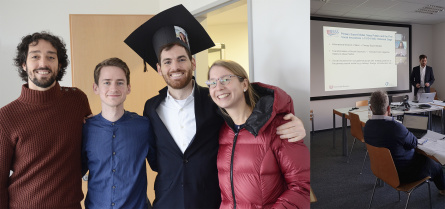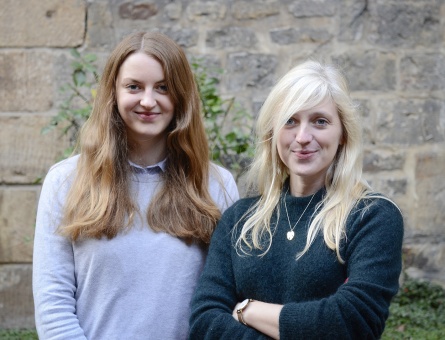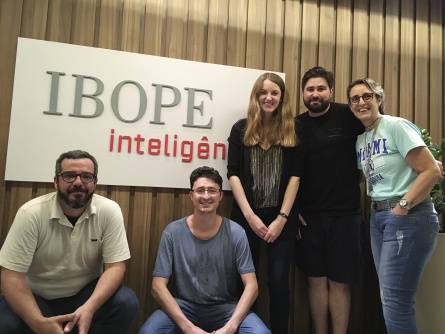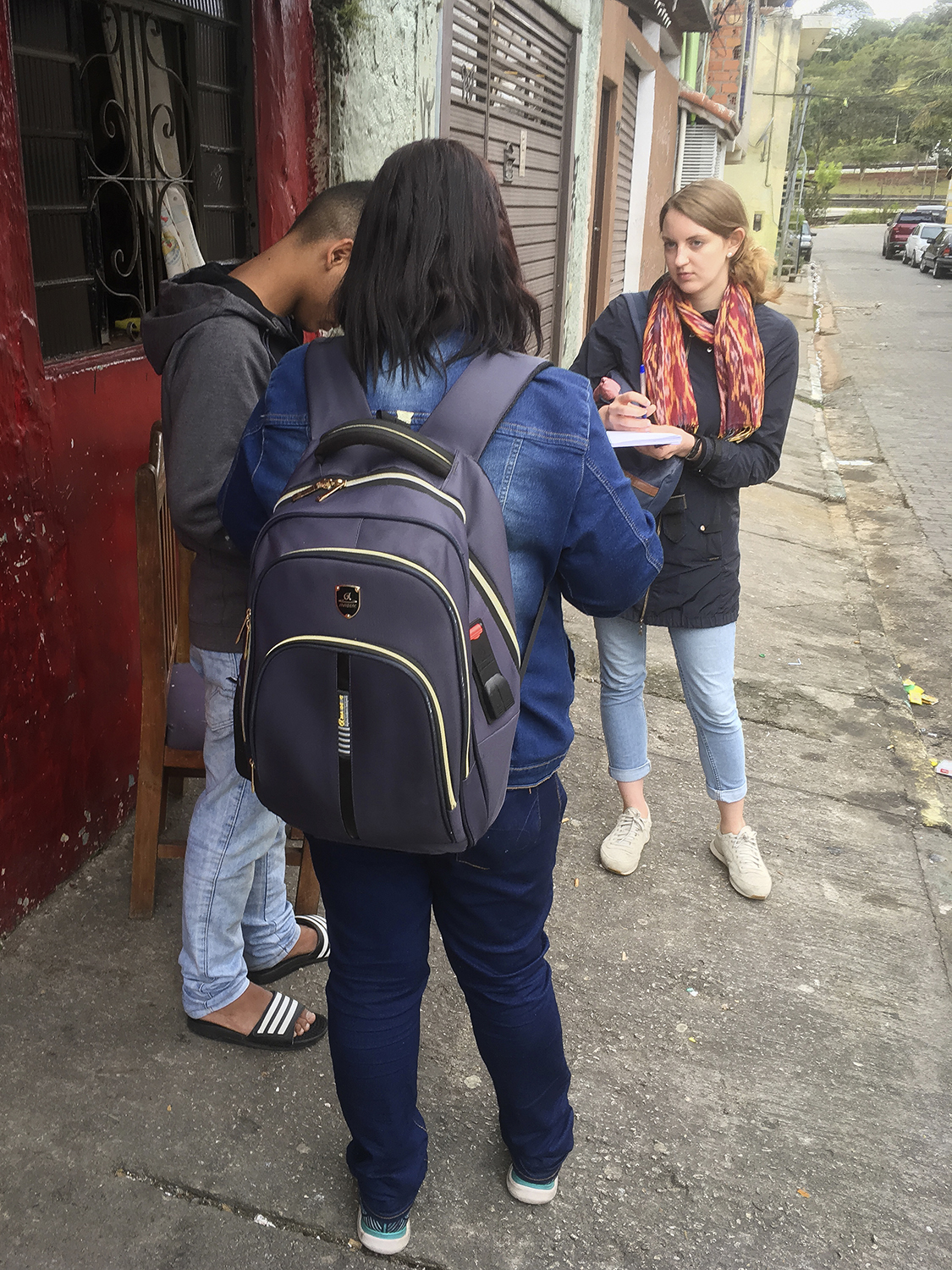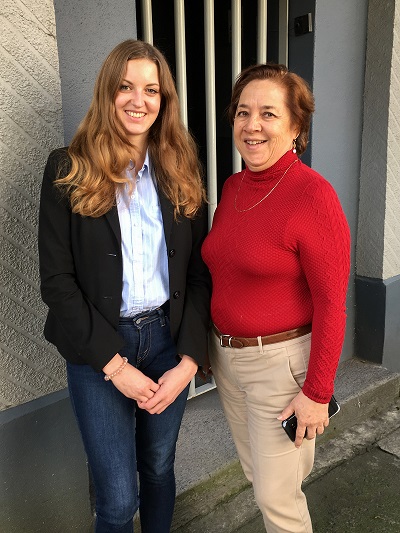Sarah Berens and Franziska Deeg of project B03 look back on their surveys in Mexico and Brazil and reveal first results.Your data collection has already taken place a little while ago: Where did you conduct your survey in Brazil and Mexico and who did you interview?
Franziska Deeg: In Mexico we conducted the survey in two states: Puebla and Querétaro. In Brazil we were in the state of Sao Paulo. Both surveys were household surveys with a representative sample. So we interviewed randomly selected people, both in the city and in the countryside.
And how many were there in each case?
Deeg: In Mexico there were 1400 respondents and in Brazil 1008.
What exactly did you want to find out?
Sarah Berens: We are interested in the social policy preferences of the Mexican and Brazilian population. We are investigating the influence of changes in economic and trade relations between countries on normal, average citizens and their social policy preferences.
How did you do this?
Berens: We have studied the phenomenon in different ways. First we asked: Do you want the state to further develop the pension system? Or the health system? Should the state spend more money on this? We asked about different policy areas within social policy: attitudes towards pensions, expansion of the health care and education systems. And also about conditional cash transfers such as Progresa in Mexico and Bolsa Familia in Brazil. We also asked more general questions, such as to what extent the respondent is in favour of more or less redistribution. And about their tax preferences: progressive income taxes, yes or no? This battery of questions allows us to examine respondents' attitudes to the welfare state from a variety of perspectives.
Deeg: In Mexico we also conducted a conjoint analysis as part of the survey. The respondents are specifically offered a policy design that varies in its design (expansion versus reduction of the program; who should have access, e.g. only formal employees or everyone; how should the program be financed, tax increase for the rich or e.g. exclusively through contributions). We ask to what extent the respondent likes this concrete policy design or would prefer to support the alternative proposal shown. He or she should then assess how well he or she liked offer A compared to offer B. Not only the design but also the analysis is now very exciting.
Did your questions differ between Mexico and Brazil?
Berens: We kept one group of questions the same so that we could compare both cases. That was important to us. The very concrete conjoint analysis on the design of social policy was very specific to Mexico. For Brazil, we designed different experiments that shed light on our big question about the influence of economic interdependence on social policy preferences in different ways, so that we have different ways of looking at the phenomenon to be explained.
Your data analysis is not yet complete, but are there already first results?
Berens: A manuscript paper already exists from the data on Mexico. We are studying economic interdependence via the labour market and migration. At the time when we were in Mexico, a great many people from Central America moved to the USA through Mexico. This is one of the issues that we asked about as part of the survey. Economic interdependence is not just trade, but also has very specific implications for the labour market through labour migration between Mexico, the USA as a strong trading partner and as a major economic power, and the other Central American countries such as Honduras or Nicaragua, which are considerably poorer. Our first paper deals with this influence of different types of migration on social policy preferences in Mexico. The argument is somewhat complex. We examine specifically the influence of two groups: refugees from Central America and returnees, i.e. Mexican migrants who have worked in the US for a while and then come back to Mexico to enter the labour market. We contrast the influence of these two groups and ask: Do they have different effects on social policy preferences for different groups within Mexico? Interestingly, it turns out that the refugees from Central America play no role in this respect: We do not see any strong effects, especially among the poorer sections of the population, who in fact should feel particularly under pressure and perceive the refugees as competitors in the labour market. Rather, it is the better educated Mexicans, the richer ones, who react sensitively to the returnees from the USA. The returnees are competitors for the well-educated because they acquired better skills in the USA. And anyway, people who go to the USA are on average a little more educated or better educated. When this group comes back, we see a greater impact on welfare state preferences among Mexicans.
And what do the better educated Mexicans want when they see that many migrants return from the US?
Berens: Less welfare state. That the cake gets smaller or limited. That only those Mexicans living in Mexico who are in the formal labor market have access to social policy programs, such as pensions. There is a shift towards more exclusion, away from solidarity. The interesting thing is that this attitude is directed against those who are actually Mexicans. It is not so much the Central American foreigners that bother them, but their fellow countrymen who went to the USA and left Mexico behind for a while and would now like to have a pension.
Deeg: Especially the formally employed are more opposed to the returnees, because those have not paid into the social security system and would still like to have access to it. The question of solidarity arises: You were in the USA and worked there. And now you are coming back and you have a good chance of finding formal employment on the labour market, because you are in any case relatively better educated than other parts of the population. And then you should still not have access to social goods.
Does that also apply to health insurance?
Berens: In Mexico the health system has been reformed and is now universal. Even people who haven't paid for their health care have access to it. The pension system, on the other hand, is based on contributions; only those who have paid in receive benefits. That's the exciting thing about our project: by looking at different policy areas that differ in accessibility for different groups, we can observe: Where is this about solidarity or exclusion?
Deeg: This is exactly why the argument in the paper is so complex, because we are looking at two groups of migrants - the refugees and the returnees. And then in Mexico we differentiate between the formally and informally employed and according to skill level. Then there are different types of social benefits, which are accessable in different ways for different groups. All this makes the point relatively complex.
How about Brazil?
Berens: There we are still stuck in huge mountains of data. We have not yet gotten around to analyzing it. For the second half of the project we will analyze this data, evaluate different experiments and compare the results with those we have found in Mexico.
Deeg: Brazil is also very interesting in terms of trade policy. Mexico is very dependent on the USA, Brazil is a little bit diversified, although there is a dependence on China for example. In any case, there are interesting dynamics, especially because the type of exports from both countries is different. That's why it's definitely exciting to take a closer look at this.
Did you also have a special perspective in Brazil, as in the case of Mexico, where you specifically looked at migration?
Berens: We also looked at migration in Brazil, because we saw that it plays such a big role in Mexico and we wanted to have the opportunity to make a statement on this with the Brazilian data. But migration in Brazil is quite different. The group of migrants that plays a stronger role comes mainly from Venezuela. And then there is a smaller group of Haitians who are driven out of Haiti by poverty and state failure and who are perceived in a predominantly negative way in Brazil.
Deeg: We also look at domestic migration. Many people from the north of Brazil migrate to the south because there are more jobs there. These internal migrants are also perceived very negatively in the cities. The question is raised whether these migrants should have access to social benefits or not. Which puts solidarity within the country to the test.
Contact:Prof. Dr. Sarah BerensCRC 1342: Global Dynamics of Social Policy
Mary-Somerville-Straße 5
28359 Bremen
Phone: +49 421 218-58603
E-Mail:
sarah.berens@uni-bremen.deFranziska Deeg
